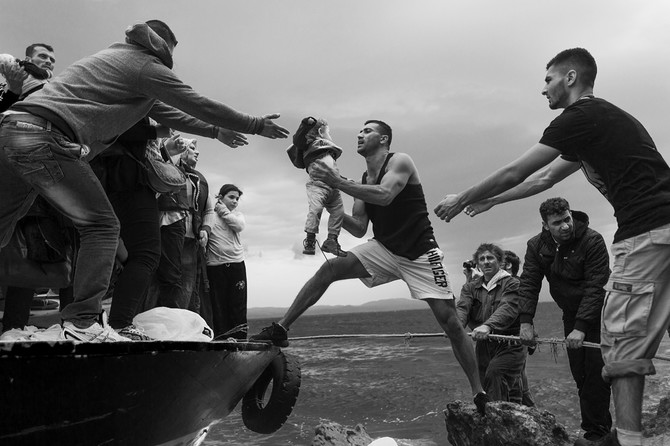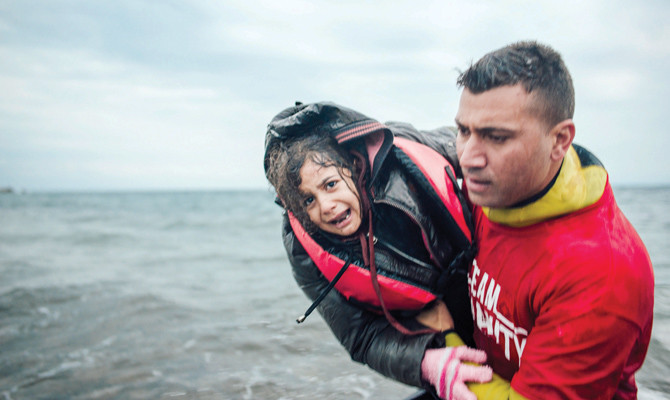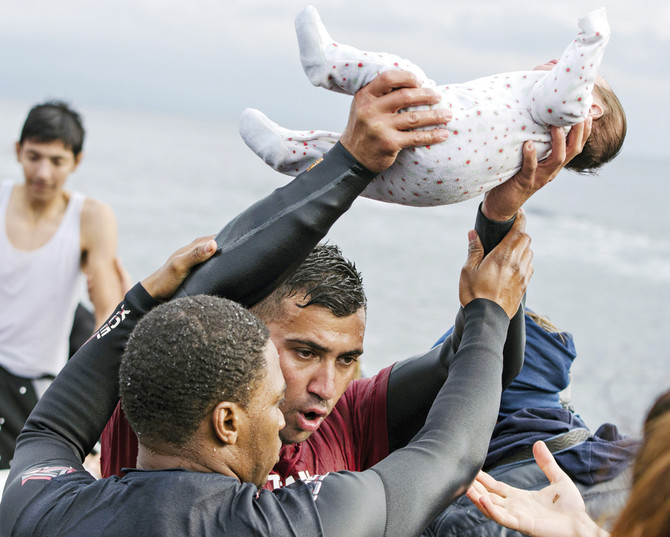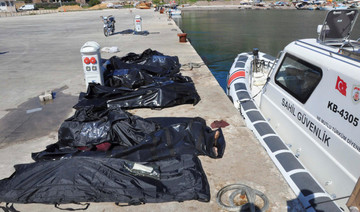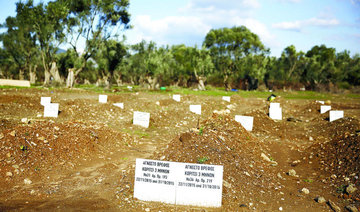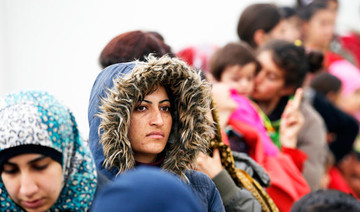JEDDAH: Exhausted and relieved, Salam Aldeen, the founder of Team Humanity, a volunteer group that helps boatloads of refugees off Europe to arrive safely to shore, is finally home in Denmark after being acquitted of charges that he was trying to smuggle the people he was actually assisting.
Aldeen faced a life sentence for answering a humanitarian call. He was arrested on his boat while trying to save lives from a brutal sea off the Greek island of Lesbos. He and four other volunteers were charged with attempting to facilitate illegal entry and smuggling.
“How do you arrest someone for helping others?” Aldeen asked. “It questions the lawful and just reasons why volunteers do what they do and it’s shameful that there’s a single hint of doubt as to their motives for doing so. I lost two years of my life doing what I loved, helping, but I was criminalized for doing it.”
Born in Moldova to immigrant parents who later became residents of Denmark after fleeing the civil war in 1992, Aldeen is slowly adjusting to life back home. In an exclusive interview with Arab News, he expressed his desire to rebuild his life after spending more than two years helping to save and assist refugees and migrants arriving on the island during the peak of the refugee crisis. “Team Humanity is not a temporary organization,” he said. “Now that I’m back, I plan on expanding my operations, but I’ll never go back to Lesvos. The mental toll was greater than I anticipated and now, at 35, I must start my life all over again and I’ll command from my base here in Denmark.”
Aldeen was originally motivated by a single photograph that brought the extent of the refugee crisis to the world’s attention in 2015. “One picture changed everything: three-year-old Aylan Kurdi, a Syrian boy who drowned in the Aegean Sea and was found face-down on a Turkish beach,” said Aldeen. “Whatever plans I had that year were scratched. I booked a ticket to Lesbos island for one week in September 2015.”
Volunteers and NGOs across Europe have flocked to the Greek islands since the summer of 2015 to help rescue and shelter the refugees and migrants, who have been arriving by boat on European shores from conflict-ridden countries such as Syria and Iraq.
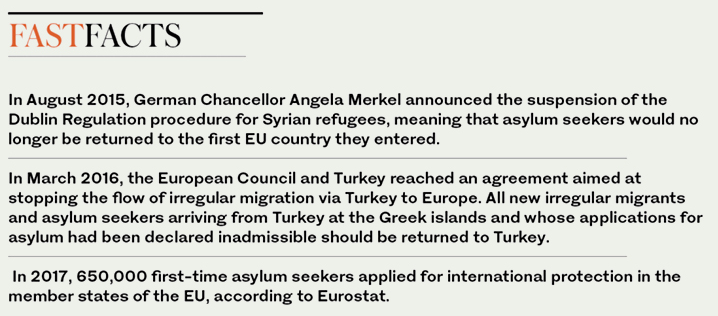
“Islanders were doing all they could to save refugees and migrants, but it was an ongoing war for them still,” said Aldeen. “The camps on the island were overflowing and Team Humanity, as well as many NGOs on the island, did their best to provide the health services they needed and were given food and shelter too.”
With their combined efforts and the skills of doctors, lifeguards and firefighters, the volunteers have helped save the lives of thousands of people landing on the island. “I am grateful to the ones that immediately responded to our first call for help addressed to the international community to help us cope with the refugee crisis,” the mayor of Lesbos, Spyros Galinos, has said.
“Helping refugees on the island was a constant rush,” Aldeen recalled. “I never took a break and survived on power naps. A bond between volunteers bloomed as the magnitude of the crisis hit us with each arrival and all hands were on deck.”
Aldeen founded Team Humanity in 2015 while on the island working alongside his partner and co-founder Amal Mahmut, a German citizen who was once a refugee herself. The team’s volunteers came from across the world, all with the intent of saving lives and making sure that refugees were provided with help before moving on to their next destination in Europe.
“I helped maneuver boats to reach land safely and at times I would need to head out with my boat along with a few volunteers, with the acknowledgement of the Greek coastguard, to save migrants and refugees from their sinking dinghies,” Aldeen explained. “All volunteers were cooperating with the authorities. They needed all the help they could get for it was overwhelming at times.” But Aldeen got mixed up in the law on Jan. 14, 2016, when he was out on patrol with four other volunteers, fellow countryman Mohammed Abbassi and three firefighters from Seville, Spain, with the group Proem-Aid: Manuel Blanco, Julio Latorre and Jose Enrique Rodriguez.
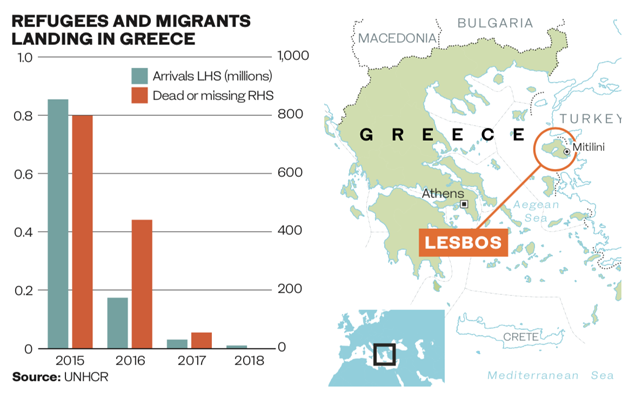
After receiving a distress call from a passenger on a sinking dinghy full of people and clearance from the Greek port authority, they were attempting to find it when the Greek coastguard intercepted them and arrested all five. The people on the capsized boat were later found by the Turkish coastguard.
Latorre said they still don’t understand the case against them. “We are an organization that works with papers registered with the local authorities and we always notify our embassy with our progress,” he said.
After being freed on bond, Aldeen was obligated to stay in Greece and check in with the authorities every week. “Up until the day of the trial, I was fearful that I wouldn’t be able to continue my life’s work. I feared for myself, my family and loved ones. But I feared most for the people that I won’t be able to save,” he said.
Still, he used his two years there as an opportunity to expand his operations to more dire locations such as Camp Idomeni, in northern Greece near the Macedonian border.
“I did what I could with the resources I had and the connections I made. All the projects were temporary since the authorities moved migrants and refugees constantly, but my time in Greece was very efficient. I helped erect shelters, schools, mosques, churches and houses of worship.”
Despite the prosecution, all the volunteers continued their work on Lesvos, supporting the Greek authorities and providing services at Camp Moria, the largest camp on the island and home to more than 7,600 asylum seekers, including about 400 unaccompanied minors.
Fast-forward to the trial of May 7. Aldeen and the rest of the volunteers were acquitted of their crimes after a judge set them free owing to discrepancies in the testimonies and evidence.
“I buried people with my own two hands, and this trial was 100 times harder,” Aldeen said. “After long hours of testimonies, the prosecutors and lawyers going back and forth, the judge said two words: you’re free.”
The room erupted in cheers as friends, families and supporters cried and ululated in celebration of the acquittal from all charges. While Aldeen won’t go back to Greece, he is determined to continue his work from Denmark.
“The relief we provide in Greece is one of many projects I intend on expanding,” he said.
“Instead of targeting countries where refugees are most likely to turn to (Greece), I want to go to the source. Build homes, schools, clinics in their war-stricken countries such as Iraq, Syria and African countries where most refugees and migrants are from. I’d want to provide them with the necessary skills to be self-sufficient and bring stability to their lives using their own skills. It’s far better than providing temporary shelter or school for children. Start-ups are more reliable with long-lasting success.”
The four others, who faced 10 years in prison, went back home to recuperate after their ordeal but have vowed to return soon. Abbassi, a Danish Red Cross worker and father of two young children whose grandparents moved to Lebanon from Palestine in the 1950s, said one day he wished to bring his children there to show them where refugees arrived to come to a new land and start a new life.
“I never understood the magnitude of the situation until I came and saw it myself,” said Abbassi, 26. “The Greek authorities needed all the help they could get, and many did come. One image, one video could change your whole perspective. It did for me and everyone that came.”


